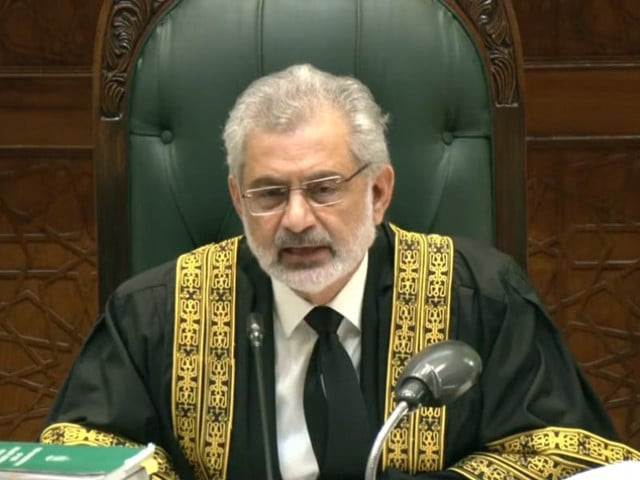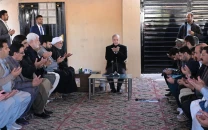Another feather in Isa’s cap
Bench asked ECP to meet with president to fix the date of holding general elections in the country

Without interpreting any constitutional provision, the Supreme Court has been successful in evolving a consensus among all relevant stakeholders regarding holding the general elections on February 8.
When he took oath on September 17, Chief Justice of Pakistan Qazi Faez Isa was facing three big challenges: questions with regard to the internal working of the apex court, trials of civilians in military courts, and holding general elections within 90 days.
Firstly, a full-court on Oct 11 upheld the Supreme Court (Practice and Procedure) Act, 2023, and a committee of the SC's three senior-most judges started forming benches after mutual consultation.
Later, on October 23, a five-member larger bench led by Justice Ijazul Ahsan declared the trial of civilians in military courts as unconstitutional.
And on Thursday, November 2, a three-member bench led by CJP Isa managed to push the relevant stakeholders to evolve consensus on the announcement of the date for the next general elections.
The bench on October 23 took up the petitions filed by the Supreme Court Bar Association’s (SCBA) and the PTI for holding general elections within 90 days.
Read CJ Isa denies adjournment in pre-arrest bail case
The bench had pointed out that if matters other than the holding of elections were to be taken up, they would require constitutional interpretation. This would attract Section 4 of the Supreme Court (Practice and Procedure) Act 2023, and a larger bench in terms thereof will have to be constituted.
All counsels and the petitioner, who represented himself, stated that they wanted to restrict their prayers only to holding general elections, and had no objection to the three-member bench.
When the bench resumed hearing the petitions on Thursday, the ECP attorney proposed the date for holding the general elections.
In its order, the bench asked the ECP to meet with the president on Thursday and to fix the date of holding general elections in the country.
"In this regard, the Attorney-General for Pakistan will arrange such a meeting and shall provide to the President this Court’s order of 23 October 2023 and today’s order, and be available to render assistance.
"We expect that the matter of appointing a date for holding general elections shall be settled, and this court will be informed tomorrow, that is, 3 November 2023," said the order.
The court said, in order to avoid controversy, it did not interpret any constitutional provision.
All people, even CJP Isa's critics, are satisfied with the announcement of the date to hold general elections on February 8. However, a senior lawyer said the bench has endorsed a violation of the constitutional provision which binds the ECP to hold general elections within 90 days.
One section of lawyers, while appreciating the bench’s approach, stated that the court made it clear that it is a constitutional requirement that elections be held within 90 days.
Even one member of the bench, Justice Athar Minallah, said that action should be initiated against those who did not fulfill their obligation and violated the Constitution by not holding the general elections within 90 days. It is expected that today's [Friday’s] judicial order will deal with these aspects of the matter.
Read more Country heads to polls after SC intervention
The debate is continuing as to how CJP Isa's approach is different from his predecessor Umar Ata Bandial in the elections case. CJP Bandial had taken suo motu notice of delay in the announcement of the date for elections for the Punjab and Khyber Pakhtunkhwa (K-P) assemblies.
However, he had remained unsuccessful in evolving consensus among all stakeholders. Even the SC was divided on the question and the powerful circles had stood with parliament against the judiciary.
Now CJP Qazi Faez Isa has made it clear that once all stakeholders agree on a date, then the court will not allow anyone to back out from elections.
It is also witnessed that the bench led by CJP Isa has completely disassociated itself from the jurisprudence evolved by the three-member bench led by former CJP Bandial.
Justice Munib Akhtar, while authoring the verdict in the Punjab Assembly elections case, had held that if the ECP failed to hold elections within 90 days for any reason, then it would have approached the SC.
The same bench had passed certain directions to the executive authorities and the ECP for making arrangements for holding elections. The SC had even issued a revised schedule of elections. However, the present bench did not follow the guidelines set by the earlier bench.
CJP Isa has made it clear that it is not the job of the Supreme Court to give the date of elections. He said every institution must work within its domain.
CJP Bandial had not allowed the Lahore High Court to decide an intra-court appeal (ICA) on elections matters. Some experts believe that Justice Bandial should have discouraged the political actors who approach the courts for a remedy after making constitutional institutions ineffective.
Soon after the success of a vote of no confidence, the PTI had decided not to sit on opposition benches in the National Assembly. In order to make its political strategy successful, it had dissolved the provincial assemblies of Punjab and Khyber Pakhtunkhwa seven months before the conclusion of their terms.
Once Justice Minallah had suggested examining the legality of the dissolution of assemblies by the PTI. However, Justice Bandial and his like-minded judges had not agreed with this proposal. If this issue had been adjudicated, a crisis could have been averted.
Talking to a private TV channel, senior PTI lawyer Hamid Khan said both President Dr Arif Alvi and the ECP failed to adhere to the Constitution while announcing the election date. "The president made a mistake by not announcing the date of elections," he added.



















COMMENTS
Comments are moderated and generally will be posted if they are on-topic and not abusive.
For more information, please see our Comments FAQ